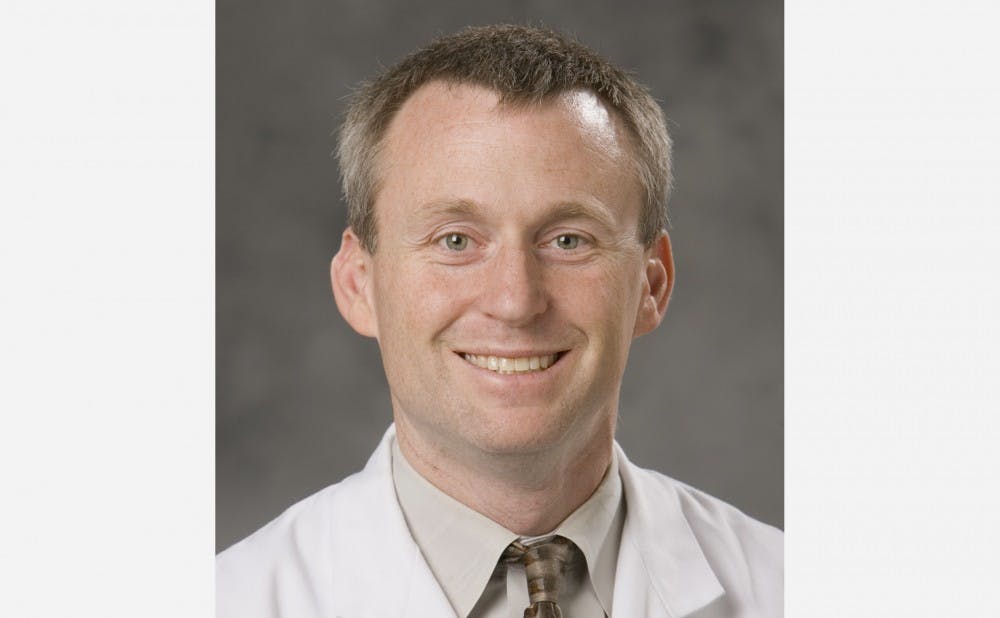Dr. David Zaas, former chief medical officer for the Duke Faculty Practice and vice chair for clinical practice at the Department of Medicine, was recently named president of Duke Raleigh Hospital.
Zaas, who has worked at the Duke University Medical Center since 2001, brings more than a decade of experience within the Duke University Health System to his new role as president. After receiving his medical degree from Northwestern University Feinberg School of Medicine and completing his residency at Johns Hopkins Hospital, he became a fellow in pulmonary and critical care at DUMC in 2001. In addition to his expertise in the medical field, Zaas also has a Masters of Business Administration degree from Duke.
“Dr. Zaas has had multiple roles in the Duke Health System. His expertise is very helpful to our community, because he is aware of our needs within the community,” said Michael Spiritos, chief medical officer at Duke Raleigh Hospital.
Duke Raleigh Hospital—along with Duke Regional Hospital and Duke University Hospital—make up the Duke University Health System. All three hospitals have unique impacts in terms of market and portfolio on local communities, Zaas explained.
Spiritos also noted that Zaas' unique profile of being an MBA physician enables him to understand the financial pressure of the competitive market, and will help Duke Raleigh navigate through the changing economic environment.
“[Zaas] has a vision of where we have to change as a profession and how we need to generate models of care delivery that bring much more focused on outcomes and cost-efficiency," Spiritos said. "The goal is to provide value-based, not volume-based health care delivery."
Zaas, whose appointment will be effective July 1, said he is ready to take on new challenges in hospital operations and is looking forward to building on the expertise he has developed over the years. Zaas aims to use his experiences at Duke Medicine as well as resources at Duke Raleigh to further provide high-quality healthcare in the local community.
“This is an opportunity to lead and reform how we deliver patient care,” Zaas said. “We aim to provide highest quality care—closer to our patient—and provide our experience in a more customer-focused fashion, focusing on the needs of patient and their families.”
Zaas also noted that ultimately, whether or not a hospital is able to provide service that is more personalized to patients is going to determine who is successful in the health system.
The special resources available at Duke Raleigh will also be an asset to the administration led by Zaas. Duke Raleigh is unique in its ability to provide highly-specialized services that are otherwise not available in Wake County, Zaas said, including orthopedics, neurosurgery and cancer therapy.
“We have a group of very specialized physicians who are renowned in spine surgery here in Raleigh, as well as Duke community spine surgeons,” Spiritos said. “This collaborative relationship between Duke physicians and community providers helps us to build care models that deliver the highest quality care for our patients.”
Duke Raleigh also has specialty-focused medical oncologists in the area of cancer therapy in all of the major tumor types, such as breast, lung and urinary cancers, Spiritos said.
In addition, Duke Raleigh differs from Duke University Hospital in its true missions. DUH is responsible for academic educational research, but Duke Raleigh doesn’t focus on basic science research or education of residents, Spiritos noted.
“We have some overlap with the clinical research in Duke University Hospital, and we share many protocols,” Spiritos said. “But some of the [protocols] are more appropriate in Durham, whereas some are more appropriate for the general type population in Raleigh.”
Duke Raleigh receives both backing and support from DUHS. Spiritos noted that Zaas' leadership, given his prior experience in Duke University Hospital, will continue to build the intwined relationship Duke Raleigh has with DUHS.
"Although Duke Raleigh is our smallest hospital, it is a major strategic priority for Duke Medicine to grow in Wake County," Zaas said.
The search for candidates to fill Zaas’ old position as chief medical officer for the Duke Faculty Practice and vice chair for clinical practice at the Department of Medicine is still underway, and Zaas expects the choice to be finalized in the next few of weeks.
Get The Chronicle straight to your inbox
Signup for our weekly newsletter. Cancel at any time.

